NYC's Long-Awaited Davis Center Opens in Central Park
A stunning new facility at Harlem Meer opens to the public this weekend!


Fall is in the air and with it, an entirely different backdrop to New York City’s art installations. Some of these installations will be leaving in early October, others will be here through the fall and beyond. The below takes us from the Brooklyn Navy Yard to City College, indoors and out. Here are 11 exhibits and installations not to miss.
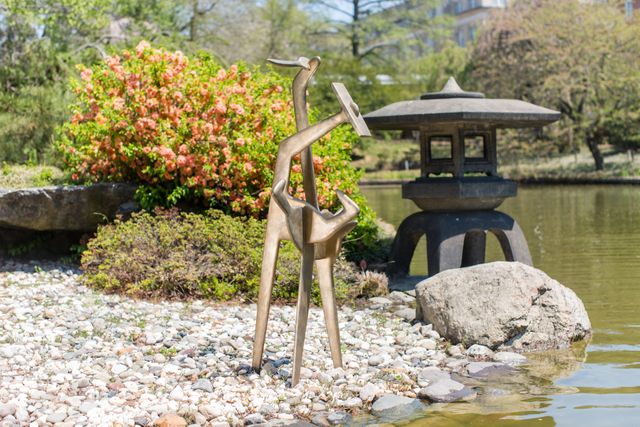
Isamu Noguchi “Strange Bird” c. 1945, cast 1971, bronze. Photo by Liz Ligon; courtesy of Brooklyn Botanic Garden
The Brooklyn Botanic Garden is celebrating the 100th anniversary of its Japanese Hill-and-Pond Garden. To kick-off the festivities, the garden, in collaboration with the Noguchi Museum, will exhibit fifteen sculptures in steel, stone and bronze, by renowned Japanese-American artist Isamu Noguchi (1904-1988). The installation opened will be on view through December 13.

As the recipient of neighborhood innovation grant from the NYC Department of Small Business Services, along with the New York City Economic Development Corporation and Business Assistance Corporation, The 100 Gates Project launched in January 2015 with an open call for artists and businesses. By April of this year, the Lower East Side Business Improvement District (LES BID) began matching artists with appropriate businesses, and as of this month, 60 gates have been completed. Go early (or late), as the murals are only visible when the businesses are closed and the gates are down. You will find the gates on the Lower East Side primarily in the area between Essex Street and Eldridge Street, just above and below Delancey.
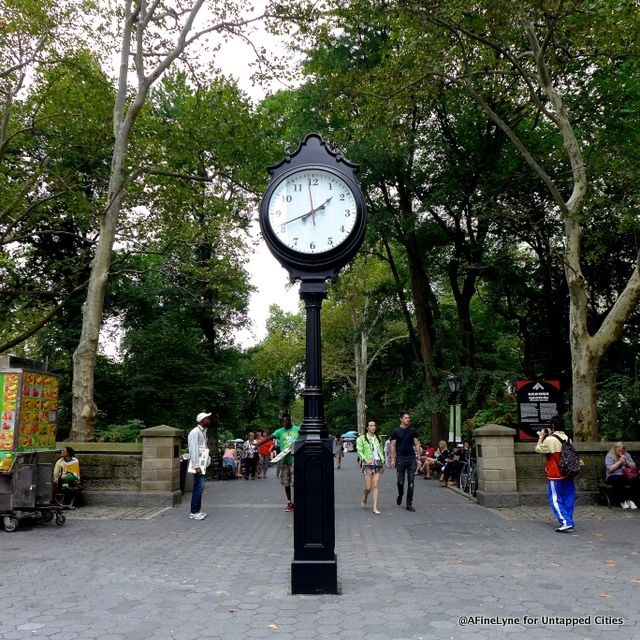
“Against the Run” by artist Alicja Kwade located at the Doris C. Freedman Plaza
The site-specific installation created by artist Alicja Kwade for the Public Art Fund at Doris C. Freedman Plaza blends in so well with its surroundings that you might not even know it’s an installation at all. With its nineteenth-century design, the viewer may not realize that the face of the clock is rotating backwards, while the second-hand appears to be standing still. The mechanism has been reversed, but in the end, it will give us the correct time. “Against the Run” prompts us to view “reality” from a different perspective. Located at Fifth Avenue and 60th Street, this installation will be on view through February 14, 2016.
Tompkins Square Park painting activities between parents and their children were the inspiration behind the current exhibit “WHATTOSEEOTTAHW.” Artist, Erini Linardaki, transferred the paintings onto wood panels, and cut out, with some of the drawings still visible, then placing the panels on the lower half of the fence specifically for the easy viewing my children. Located in the Slocum Memorial Fountain Plaza area, this exhibit and calendar of events will run through April 30, 2016.
“Flow.15” is the fifth annual art exhibit on Randall’s Island. Made possible by the NYC Parks Department, The Bronx Museum of the Arts and Randall’s Island Park Alliance, the exhibit will include the works of five artists, with installations that are meant to reflect the island’s history and environment. The artists include Nicholas Fraser and “All Consuming“, Sharon Ma and “hello“, Rob Swainston and “Who Owns the Sky?“, David Wilson and “Etherwave Architecture #1“, and Rica Takashima, pictured about with the central piece of her exhibit “El Barrio Comes in All Colors, Shapes and Sizes.
Ms. Takashima wanted her installation to be based on a person who could see Randall’s Island from home. She walked the streets of El Barrio, taking in the colorful murals and shops, buying a book about the neighborhood from a local bookshop, and settling down in a local cafe to read it. It was the owner of the cafe who inspired her and became her model for her installation, “El Barrio Comes in All Colors, Shapes and Sizes.” The work of these five artists will be on view through November.
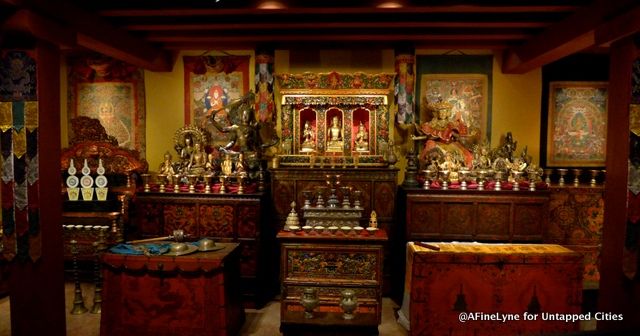
“Sacred Spaces” will open at the Rubin Museum on October 23. This exhibit will include an expanded Tibetan Buddhist Shrine Room, with flickering butter lamps, incense and the sounds of monks chanting – an invitation for the viewer to have an experience of being inside a shrine room of a traditional Himalayan home. The hope is that viewers will use their time within the exhibit to fully immerse in the practice of offering, devotion, prayer and contemplation.
As part of the installation, a panoramic photograph taken in the province of Mustang, northern Nepal, by photographer Jaroslav Poncar, will be on view, showing the landscape in which Tibetan Buddhism flourishes today. A video of an Indian ritual created by Deidi von Schaewen will showcase a Jain communal ritual in which we will see devotees pouring offerings over a stone sculpture – a tradition in which this figure is anointed every twelve years over the course of four days.
Opening on October 23, it will be on view through March 27, 2017 at the Rubin Museum located at 150 West 17th Street.
The City College Spitzer School of Architecture is presenting an exhibit by the Landing Studio which will transport us in an enormous crate to hybrid territories of salt mining operations across the continents. In this exhibit, “It Still Takes Twelve Days“, viewers will experience “two moments in global industrial production: the translation of natural processes into industry and the intersection of industry and the city.” The title reflects the fact that, even in our current global environment, it still takes about twelve days to ship across the Pacific from China to New York. Landing Studio is the recipient of The Architectural League Prize 2015 and a winner of the Design Biennial Boston in 2015. This exhibit is free and open to the public through April 2016. Located in the Atrium Gallery, 141 Convent Avenue at 135th Street.
“Crow’s Eye View: The Korean Peninsula” curated by Minsuk Cho, is a group show inspired by “Crow’s Eye View”, a poem by the Korean architect and poet Yi Sang. This exhibit hopes to explore architectural interventions that reflect, and have shaped, the Korean Peninsula over the past 100 years. The exhibit presents a wide range of work by architects, urbanists, poets, writers, artists, photographers, filmmakers, curators and collectors. It was awarded the Golden Lion for the Best National Participation at the 2014 Venice Biennale and gives the viewer a glimpse into a South Korean point of view. “Crow’s Eye View” is on view at the Tina Kim Gallery‘s new space, 525 West 21st Street through October 17.

Diagram showing bus routes connecting the Mohegan Sun to towns all over the Northeast. Credit: Stephen Fan and Shane Keaney
At the Museum of Chinese in America, architecture and art history professor Stephen Fan curates an “Sub-Urbanisms” based off an anthropological case study of the conversion of suburban single-family homes into multi-family communities by immigrant Chinese casino workers in Connecticut. Addressing the norms, cultural values, and public policies that determine how most Americans live, the exhibition juxtaposes immigrant cultural beliefs and pragmatism with suburban American social, aesthetic, and financial codes. It also provides insight into the long-term effects of 9/11 on the New York Chinatown service industry as a significant factor behind the influx of Chinese labor seeking employment at the region’s casinos, and the formation of this satellite suburban Chinatown.
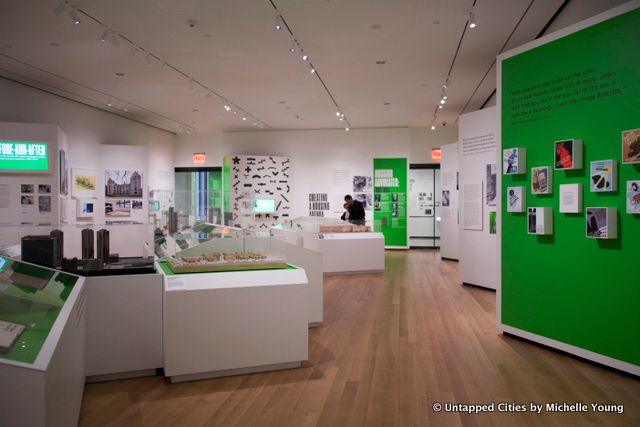
With the recent initiative of Mayor Bill DeBlasio to preserve and create 200,000 affordable housing units within the next ten years, this new exhibit by the Museum of the City of New York is both timely and educational. “Affordable New York: A Housing Legacy” explores and documents the many ways in which activists and policy makers have fought to promote subsidized housing. It offers a timeline of the past, current and even the future of our housing initiatives, giving the public a rare glimpse inside the system by way of a series of panel discussions with developers, architects, professors, housing advocates and community leaders. The exhibit and calendar of events will run through February 16, 2016.
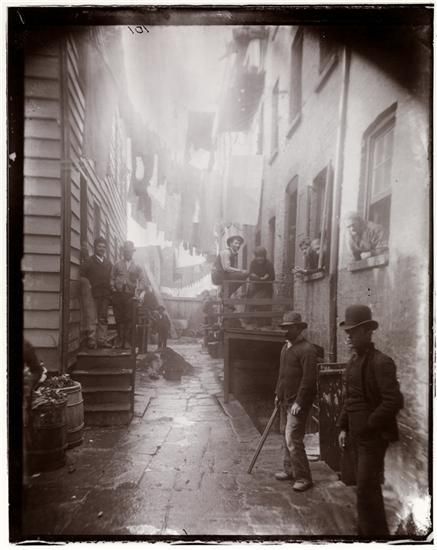
Bandit’s Roost, 59 1/2 Mulberry Street – Jacob A. Riis c. 1890. Photo from Museum of the City of New York.
Opening October 14 at the Museum of the City of New York, is the exhibition “Jacob A. Riis: Revealing New York’s Other Half.” Mr. Riis, who was a newspaper reporter and social reformer, was known for reporting on the crisis in housing, poverty, crime and education in New York at the turn of the 20th Century. This is the first major retrospective of his photographic work, and will include the Jacob A. Riis Papers from the Library of Congress. Opening on October 14th, the exhibit will be on view through March 20, 2016.
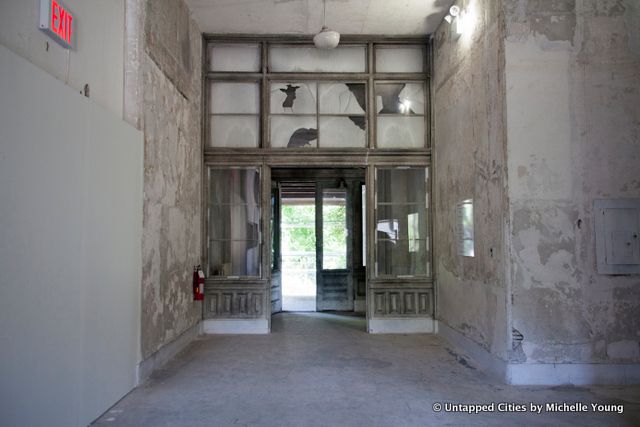
Abandoned Brooklyn Navy Yard Hospital
The abandoned hospital building known as R95 located inside the Brooklyn Navy Yard, opened its doors to the public this month, in a rare artistic endeavor, exploring war and combat. The artist, Bettina WitteVeen selected this particular building to serve as a metaphor for her photographic exhibit, “When We Were Soldiers…Once And Young (WWWS).” The rooms are labeled with the types of injuries sustained in war, accompanied by photographs of soldiers and warscapes, both present and past. Her photographs display a range of our wars from the American Civil War to Vietnam and conflicts in both Afghanistan and Iraq. The exhibit, produced in partnership with Steiner Studios, will be open to the public with advance tickets required, through October 24.
Next, check out our outdoor art installation picks for September–many are closing soon! Get in touch with the author at AFineLyne.
Subscribe to our newsletter